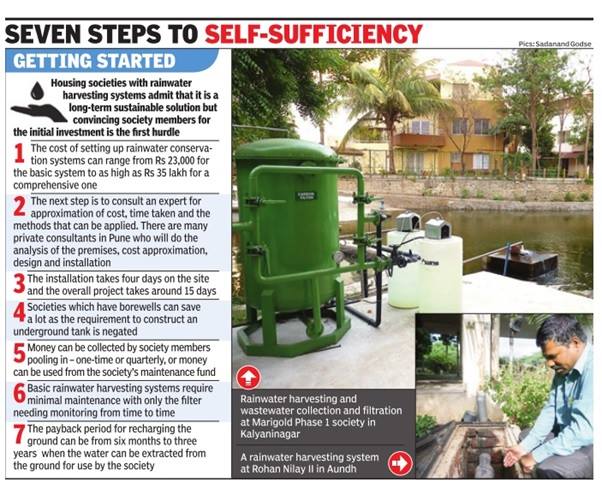WATER CRISIS TROUBLING YOUR HOUSING SOCIETY?
Has your housing society been facing constant water cuts due to shortage in water supply? Is investing in water tankers and booster pumps the permanent solution?
RAINWATER HARVESTING – THE SOLUTION TO OUR WATER CRISIS
If implemented properly, the cost of a water harvesting or recycling system, would be minimal compared to its gains.
Rainwater Harvesting involves the process of diverting rainwater from surfaces to tanks or into the ground, for use at a later stage. Underground tanks can be used, to store the rainwater and it can be used for flushing or gardening. However, the amount of water that can be stored, is limited by the size of tank. Hence, an alternative method, is to dig bore-wells in the ground and divert the rainwater into it, to recharge the ground water. From bore-wells, this potable water can be pumped for daily use.
By using harvested rainwater, housing complexes and individual households can reduce their dependence on municipal water supply and/or water tankers and thereby, save money.
Has your housing society been facing constant water cuts due to shortage in water supply? Is investing in water tankers and booster pumps the permanent solution?
RAINWATER HARVESTING – THE SOLUTION TO OUR WATER CRISIS
If implemented properly, the cost of a water harvesting or recycling system, would be minimal compared to its gains.
Rainwater Harvesting involves the process of diverting rainwater from surfaces to tanks or into the ground, for use at a later stage. Underground tanks can be used, to store the rainwater and it can be used for flushing or gardening. However, the amount of water that can be stored, is limited by the size of tank. Hence, an alternative method, is to dig bore-wells in the ground and divert the rainwater into it, to recharge the ground water. From bore-wells, this potable water can be pumped for daily use.
By using harvested rainwater, housing complexes and individual households can reduce their dependence on municipal water supply and/or water tankers and thereby, save money.

Great blog! Understanding the importance of CGWA NOC for groundwater extraction is crucial for businesses and industries. The Central Ground Water Authority plays a vital role in regulating and conserving water resources, ensuring sustainable usage. Your blog effectively highlights the application process, compliance requirements, and penalties for non-compliance. This information is essential for companies seeking CGWA NOC approval. Looking forward to more insights on regulatory updates and best practices for water management! Keep up the great work!
ReplyDelete